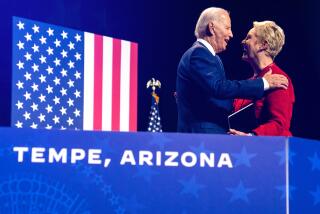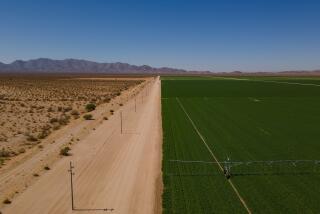Big Banks Gird for Battle on Arizona Frontier
- Share via
PHOENIX — Arizona, which prides itself on its Western heritage and values, crosses a new frontier this week when its interstate banking bill, as broad as any in the nation, takes effect.
Starting Wednesday, the state becomes a battleground for some of the nation’s biggest banks and perhaps a window into the future of U.S. banking.
But the full effects of the change are not likely to be felt for several months, when previously announced mergers are completed and banks begin to compete in earnest for an expanded share of the rich and growing Arizona banking market.
By early next year, six of Arizona’s seven largest banks will be owned by out-of-state banking companies, including such giants as Citicorp, Chase Manhattan, Security Pacific and First Interstate.
Smaller banking firms, based in cities from San Diego to Milwaukee, also have agreed to pay fat premiums to enter what analysts consider one of the nation’s premier banking markets.
But if Arizona is about to become a financial colony of New York and Los Angeles, no one here is complaining. Most bankers and businessmen welcome the expected flow of fresh capital and competition as the new institutions vie for market share and customer loyalty.
Arizona’s legalization of interstate banking merely ratifies the longstanding presence of “foreign” financial institutions in the prosperous Sun Belt state.
Out-of-state banks have been active for years in Arizona in business lending, consumer finance, mortgages and credit cards. Nearly 40% of the bank credit cards carried by Arizonans are issued by New York and California banks.
The new law allows out-of-state banks to gather deposits and offer a full range of banking services by buying existing Arizona banks.
The immediate beneficiaries will be shareholders of acquired banks, who will be reaping rich rewards.
Newspapers, radio and television stations will also profit, carrying thousands of dollars worth of bank advertising trumpeting new ownership ties and offering special deals to lure customers away from their current banks.
Global Services
In their promotional campaigns, the New York banks, Chase and Citicorp, will stress their global services and credit cards, the California banks will push their electronic teller networks and account packages, and the Arizona banks will emphasize local ownership and personal service.
“It’s going to be a lot of fun down here, a lot of action,” predicted Norwood W. (Red) Pope, chief of marketing for Valley National Bank, Arizona’s largest bank and the state’s largest remaining independent.
Valley National last week announced a giveaway deal for new certificate of deposit buyers. For every CD of more than $5,000, depositors will receive a gift ranging from a clock radio to a home security system.
More fun and games are sure to follow.
Bankers and analysts expect consumers to benefit from lower loan rates and higher interest on savings as banks fight for market share.
But many bankers warn that such price wars will be short-lived because they are ultimately damaging to the banks.
“There will not be an out-of-control struggle for market position. If there is, we’re going to fight for our share,” said Richard J. Flamson III, chairman of Security Pacific in Los Angeles, which agreed last year to pay $480 million to buy Arizona Bancwest, parent of Arizona’s third-largest bank. “But I don’t see that taking place. It never works. And it costs the shareholders a lot of money.”
Rapid Growth Rate
Arizona is attractive to out-of-state bankers for a number of reasons. It has been one of the nation’s fastest-growing states for two decades, and the migration and economic growth rates show no sign of slowing.
It is home to many middle-size companies whose business is profitable to banks. Arizona annually attracts thousands of vacationers and well-off retirees, who spend liberally at the state’s many golf resorts, campgrounds and hotels.
The state is dominated by a conservative, pro-growth business community that is more than happy to welcome out-of-town companies and out-of-state capital.
To top it off, the state Legislature last year passed an interstate banking bill that allows the purchase of Arizona banks by banks from any other state, with virtually no restrictions.
Only Alaska and Maine have laws as liberal, but those states are not considered hot banking prospects.
Nearly 40 states have now passed some version of interstate banking legislation, but most restrict cross-state mergers to a specific geographic region.
Regional Mergers
California’s recently enacted bill allows regional mergers from 1987 until 1991, then full nationwide banking. But it limits acquisitions to those states that allow California banks to do business in their home markets.
Most bankers acknowledge the inevitability of coast-to-coast banking and will be watching Arizona closely to see how the major institutions behave there and whether smaller community banks will survive the competition.
The two biggest fears that have slowed the onslaught of interstate banking are that New York and California banking giants will milk local customers for funds to lend to big corporate borrowers and foreign nations and that community banks will be gobbled up by a handful of national mega-banks.
Officials of the big banks that are entering Arizona, with the exception of Citicorp, say they intend to leave the management of Arizona banks in local hands.
Citicorp, which is buying the troubled Great Western Bank & Trust (not connected with the big California savings and loan firm), has indicated that it plans to bring in new executives and change the bank’s name.
And, rather than drain capital from Arizona, these banks intend to commit additional funds there, officials said.
No ‘Cash Cow’
James P. Simmons, chairman and chief executive of United Bancorp, which has been bought by Los Angeles’ Union Bank, said he has been assured that his bank will not be a cash cow for its new owners.
“I think it’s going to be just the opposite,” he said. “We’ll be able to do larger credits, and the money will come from Union and Standard Chartered.” Standard Chartered is Union Bank’s British parent.
Simmons said he was talking to a potential borrower earlier this month about a $25-million loan, which before the merger would have exceeded the bank’s legal lending limit of $21 million.
(Banks are banned by federal regulations from lending more than 1% of total assets to a single borrower.)
The potential trade-off for this infusion of capital is the removal of decision-making from local hands. To capitalize on this development, Valley National plans to stress its local ownership in its publicity campaigns, officials said.
“In our advertising, we’ll be playing up the idea that we’re the only major bank that’s Arizona-based. Decisions will be made here, not in New York, Los Angeles or London,” said Howard C. McCrady, Valley National’s chairman and chief executive.
Executives of newly acquired banks, however, stoutly deny that they have been “colonized” by “foreign” bank powers.
“A fear that is voiced constantly by the community is that we will have absentee management,” said Don B. Tostenrud, chairman of Arizona Bancorp. But he said that on the day the deal with Security Pacific closes in mid-October, “I don’t expect anything to happen. We’ll have the same board and the same management.”
Continue Community Support
He said the bank would continue to base its lending decisions on the quality of the borrower and the needs of the community. He also said the bank would continue its strong support for civic charities and cultural affairs.
Tostenrud said the only obvious changes at the bank will be that two or three Security Pacific officials eventually will take seats on the Arizona bank’s board, and the words “a Security Pacific company” will appear under the bank’s name in advertising.
Except for Valley National, Arizona’s remaining independent banks are small community institutions, each with less than $50 million in assets. There are about 45 such banks, many of them recently formed with an eye toward future acquisition, according to state banking officials.
In the past five years, 26 new banks have opened and another nine are awaiting charters. State Banking Supt. Mary Short predicted that five years from now, through mergers and acquisitions, there will be only about 40 banks in Arizona.
John T. Wertheim, chief executive of 2-year-old First Business Bank, said Arizona may mirror the future of U.S. banking in a few years because it will have only two types of financial institutions: big, supermarket-style banks, catering to the mass audience, and small “niche” banks like his, targeted to a specific customer base.
Banks of intermediate size will have to grow large by swallowing up smaller banks or will be swallowed up themselves, he said.
Wertheim’s bank lends only to a select group of middle-size companies and writes mostly short-term inventory finance loans. It also provides personalized banking services for a small, well-to-do clientele.
He said he intends to stay independent by sticking to his strategy. But, he added, “everything is for sale, for a price.”
Many California bankers are looking to Arizona as a precursor of what might happen when California’s interstate banking law takes effect over the next four years.
Most expect that it will lead to intense initial competition for market share and to fewer and larger banks through acquisitions and mergers. But analysts say the comparisons end there.
“Let’s face it,” said McCrady of Valley National, “Arizona is a small state. California is a country.”
ARIZONA’S 10 LARGEST BANKS
Assets Market Bank in billions share* Status Valley National $9.64 41.3% Independent, locally owned Bank of Arizona First Interstate $6.12 26.2 Owned by First Interstate Bank of Arizona Bancorp, Los Angeles Arizona Bank $3.94 16.9 To be acquired by Security Pacific Corp., Los Angeles United Bank of $2.10 9.0 To be acquired by Union Arizona Bancorp, Los Angeles Continental Bank $0.54 2.3 To be acquired by Chase Manhattan Corp., New York Great Western $0.51 2.2 To be acquired by Citicorp, Bank & Trust New York Thunderbird Bank $0.23 1.0 To be acquired by Marshall & Illsley Corp., Milwaukee Century Bank $0.17 0.7 Independent, locally owned Bank of Scottsdale $0.06 0.3 Merging with Bank of Paradise Valley, Ariz. Metropolitan Bank $0.06 0.2 Independent, locally owned
* As percent of total for 10 largest banks.
Source: Keefe, Bruyette & Woods
More to Read
Inside the business of entertainment
The Wide Shot brings you news, analysis and insights on everything from streaming wars to production — and what it all means for the future.
You may occasionally receive promotional content from the Los Angeles Times.










